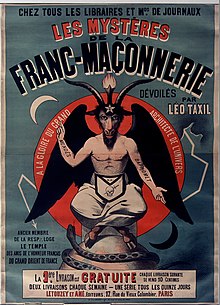
Back Измама на Таксил Bulgarian Taxil-svindelnummeret Danish Taxil-Schwindel German Fraude de Taxil Spanish Affaire Léo Taxil French Fraude de Taxil Portuguese Розыгрыш Лео Таксиля Russian Taxils bedrägeri Swedish

The Taxil hoax was an 1890s hoax of exposure by Léo Taxil, intended to mock not only Freemasonry but also the Catholic Church's opposition to it.[1]
Taxil, the author of an anti-papal tract, pretended to convert to Catholicism (circa 1884) and wrote several volumes, purportedly in the service to his new faith. These included the adventures of one Dr. Bataille, a surgeon serving in the French merchant navy who has infiltrated the Freemasons and observes their evil rituals as they occur all over the world. Buddhists, Hindus, and Spiritualists join with Freemasons in conspiring against the Catholic church, and Bataille uncovers an even more secret order within the Masons called the Palladists, who take their orders directly from demons.[2] As Dr. Bataille's tale unfolds, he introduces Diana Vaughan, a former high priestess of Palladism who has converted to Catholicism and is in grave danger of assassination from vengeful Freemasons.[2]
In 1897, Taxil called a press conference at which he promised to produce Vaughan. Instead he announced that his revelations about the Freemasons were made up, and thanked the Catholic clergy for helping to publicize his stories.[3] Nine years later he told an American magazine that he at first thought readers would recognize his tales as "amusement pure and simple"—too outlandish to be true—but when he realized they believed them and that there was "lots of money" to be made in publishing them, he continued to perpetrate the hoax.[4] Despite this debunking, belief in Vaughan and the Palladists did not entirely die and the Palladists appeared in a 1943 noir film The Seventh Victim.[2]
- ^ written by Noah Nicholas and Molly Bedell (2006-08-01). "Mysteries Of The Freemasons — America". Decoding the Past. A&E Television Networks. The History Channel. Archived from the original on 2007-05-09.
- ^ a b c Laycock, Satanism, 1981: section 2 Imagining the Black Mass. The Taxil Hoax
- ^ Cite error: The named reference
Confessionwas invoked but never defined (see the help page). - ^ Cite error: The named reference
National Magazine, 1906was invoked but never defined (see the help page).
© MMXXIII Rich X Search. We shall prevail. All rights reserved. Rich X Search